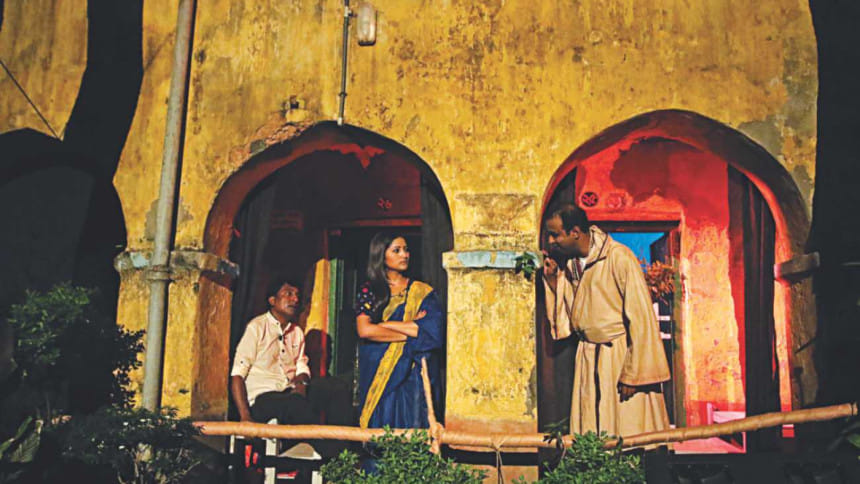An Eternity in One Night

Theatre group Teerondaj's choice of Badal Sircar as the playwright to be presented during their agitprop event at 'Beauty Boarding', on April 28, 2017, Friday, was appropriate for two reasons. Firstly, the theatre group's anti-establishment stance, which has led to their being denied bookings at the national auditoriums, was at the crux of their decision to use alternate venues, as a mode of protest. Therefore, staging Sircar, known for defying the system through his 'Third Theatre' movement, was most apt. Also, setting up stage in the run-down, but culturally significant venue, resonated Sircar's belief that, props and costumes while used to create an illusion of reality, are superfluous; since spectators come to theatre ready to use their imagination and are prepared to accept the stage as a stage, at any cost.
Of course it was the heritage value of the boarding house, once the hub of 'adda', or intellectual exchange, within the young literary intelligentsia of the 1960s, which had drawn the audience, that night, to the premiere of Teerondaj's play, 'Shaararattir'. From our eminent Poet Laureate Syed Shamsul Haque's memoirs we learn that it was Poet Shahid Qadri who had begun the trend of patronizing this cozy little boarding house, established by the two brothers Prahlad and Nalini Shaha in the late 1940s. Their generous hospitality towards artistes, writers, filmmakers et al, soon made it a pilgrimage for the young, aspiring creative community. From 1952 to 1967, this was Syed Haque's den, in a corner of which he wrote some of his greatest pieces of literature. Haque Bhai fondly reminisces, too, the visits of the Bengali swimmer Brojen Das, who became the first Asian to swim across the English Channel, and the effort the Shaha brothers made to arrange healthy meals for him from the nearby eatery of Gobindo's. Of greatest sorrow is the heavy price the siblings had to pay on the deadly night of March 28, 1971 when the Pakistani Army mercilessly murdered Prahlad and seventeen other boarders.
Teerondaj did well to arrange an 'adda', before its theatrical offering, fondly titled 'When there was fire in the River'. Did the past tense mean to suggest the waning of passion in recent times? Having myself been coopted to be part of the discussion, I felt mildly frustrated at the lack of sharpness in the dialogue. One misses the cutting-edge discourses informed by progressive politics.
The innovative use of space and the youthful fervor of 'Saararattir', did make up, though, for the disappointment. Swinging between the real and the surreal, we see a different Sircar, exploring the deeply personal emotions of a man and his wife, seeking refuge in a seemingly abandoned mansion, on a stormy night. Challenged by the elusive and mysterious owner of the homestead, the couple is pushed into confronting their deepest desires and aversions. That one night becomes a symbol for the exploration of a life-long of yearnings, as one is reminded of Blake's timeless verse,
'To see a World in a Grain of Sand
And a Heaven in a Wild Flower,
Hold Infinity in the palm of your hand
And Eternity in an hour.'
Director Deepak Sumon is to be congratulated for intelligently negotiating the available performance area, specially the use of the upstairs balcony to locate supernatural characters representing unconscious and unchallenged emotions within each person. Even if a bit jerky, as premieres sometimes are, the three main protagonists played by Sumon, himself, Nasrin Nasha and A K Azad Setu, were commendable in their roles; except, maybe, that little bit of amateur portrayal of total abandonment to 'anondo' or 'ecstasy' as desire drowns all. Throughout the play the spectator is led to question the very existence of the strange landlord. The director would have done well to engage more with this elusiveness. Clarity seemed to limit the almost impossible scope of Sircar's theatrical landscape. The music too left much to be desired. Having said that, the team's passion almost made up for whatever was lacking, as did the very ambiance of the venue.
One wonders, though, how such enactments would play out in top-notch venues like the National Auditorium. Isn't it time to rethink the need for professionalism in theatre?
To end our night out at 'Beauty Boarding', we treated ourselves to a dinner of 'shorsheilish' and 'murighonto',
which I highly recommend to future patrons of the venue.
Maybe history can be relived.

 For all latest news, follow The Daily Star's Google News channel.
For all latest news, follow The Daily Star's Google News channel. 



Comments